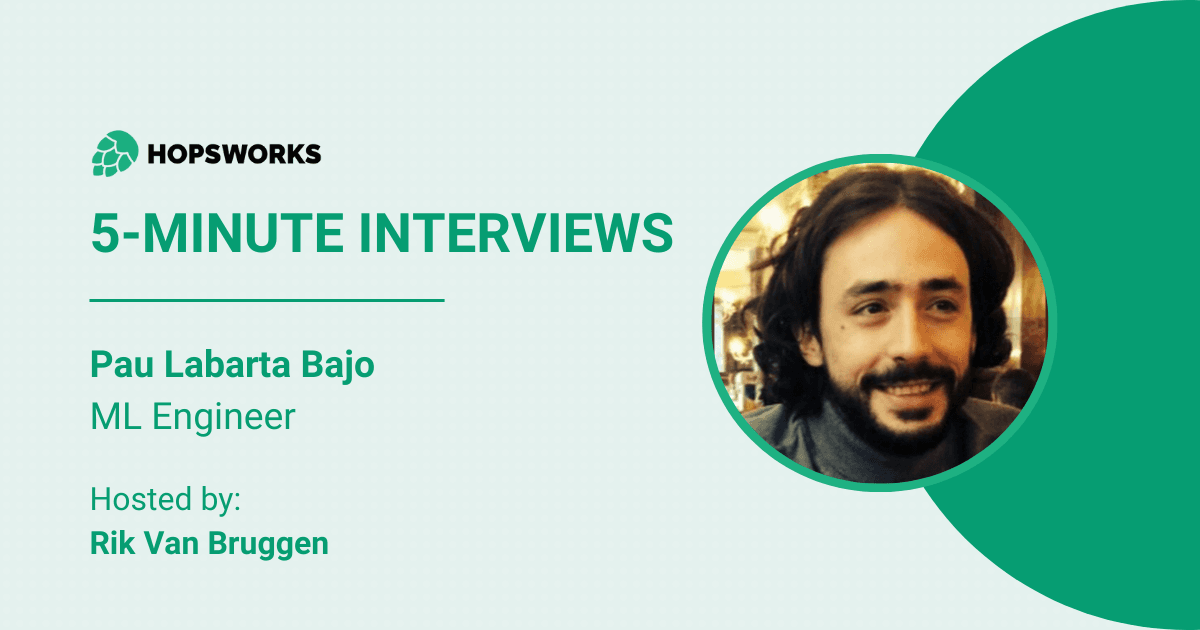5-minute Interview with Pau Labarta Bajo
In this interview we meet Pau Labarta Bajo, a freelance Machine Learning Engineer who creates educational online content and courses for aspiring ML professionals.

“Machine learning is all about problem solving, so you should base your learning on solving problems”
In our ‘5-minute interview’ series we meet AI and ML professionals who will share their experiences on working in the Machine Learning field. How did they start out and what aspects of AI and ML make them tick? What are their passions and what drives them to create major tech innovations?
Next up in our lineup is Pau Labarta Bajo, a freelance Machine Learning Engineer. He is one of the most prominent ML advocates online and produces hands-on educational ML content through his newsletter Real-World Machine Learning (RW ML) and online courses.
Tell us a little about yourself.
Pau: I'm a Machine Learning Engineer but originally, I started out by studying math. When I started out about 10 years ago I wanted to become a researcher in academia. But then along the way I just lost interest in that field. So back then, when I initially started working, I started out as a Quantitative Analyst. At the time, it was not called machine learning (ML), it was called applied statistics. So eventually, about 8 years ago or so, when machine learning started to become an established thing, I decided that I wanted to be a Data Scientist.
I never studied a Masters in data science, which is what people do these days, but I learned it by working as a data scientist. Step by step, I started working with machine learning because it's the natural next step in that career. The machine learning field was moving so fast so I felt like I was missing out on new things. So I felt like I needed to change my way of working so that I’m able to continuously learn new things, and that’s when I started doing freelance.
Around two years ago I segwayed into what I’m doing now, which is creating educational content about machine learning on social media. I’m helping aspiring machine learning engineers and data scientists who are entering the industry from a very hands-on / applied perspective, which is exactly the path that I took. Basically, I’ve made my hobby into my job.
What is it that attracted you to the field of Machine Learning?
Pau: The first thing is that this field has a lot of open problems and there are constantly new things being discovered. As a mathematician, I like solving problems and machine learning is full of them. The other thing is that these problems transfer very well across industries. By working in machine learning you will somehow give yourself the opportunity to change industries (mobile gaming, financial services, retail etc.) more often than in other disciplines. That's something that I've done in the past that I found very stimulating. Machine learning applies to many different problems and always follows the same principles, like good data engineering practices, but it always has business specific problems that you need to understand and need context for and depends on which industry you’re in.
Hopefully, in the future, machine learning can be applied to not only short-term problems, such as how to increase business profit etc., but also to bigger issues that we have these days. I'm referring to issues such as pollution or industry processes that are far from optimal. There are a lot of issues which are not solved because they’re not politically relevant, but as soon as there starts to be more political pressure on that, the way to solve the problem is pretty straightforward (from a machine learning perspective).
What resources do you recommend people to look at if they want to become a great professional in the field?
Pau Labarta Bajo: If you are at the very beginning of your machine learning journey, I would recommend you to go to Kaggle which is a very known website with a lot of data sets, notebooks and competitions. It's a way for you to actually get your feet wet, build your first models and actually understand how it all works. As soon as you are comfortable with the fundamentals I always recommend that you work on projects, which means that you take a real world problem that interests you and you basically find data that can help you build a model to predict something relevant.
You'll learn a lot this way but you’ll also feel frustration. I have these feelings of frustration a lot these days. As a python developer, I'm trying to learn Rust at the moment. A language which is gaining a lot of popularity within the Data Engineering, MLOps and LLMOps communities. But if I start learning Rust by checking books and trying to understand how everything works I get lost. I lose the motivation. What I'm doing instead is that I'm fixing a problem. So for example, I’m trying to deploy a machine learning model using Rust. I spent yesterday evening being very frustrated trying to understand why this thing is not compiling, I spent three hours trying to figure it out. When I eventually found the solution, I realized that I learned a lot by “wasting” these three hours, that I learned more this way than just following a curriculum. Because as I said, machine learning is all about problem solving, so you should base your learning on solving problems. So my recommendation is to get your feet wet with Kaggle, but as soon as you're comfortable with that, build a project.
Listen to this and other episodes on Spotify: